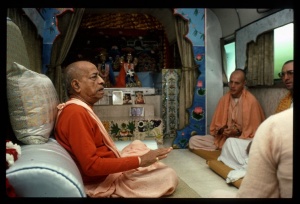CC Antya 4.81: Difference between revisions
m (1 revision(s)) |
No edit summary |
||
| Line 1: | Line 1: | ||
{{ | [[Category:Sri Caitanya-caritamrta - Antya-lila Chapter 04|C081]] | ||
<div style="float:left">'''[[Sri Caitanya-caritamrta|Śrī Caitanya-caritāmṛta]] - [[CC Antya|Antya-līlā]] - [[CC Antya 4|Chapter 4: Sanātana Gosvāmī Visits the Lord at Jagannātha Purī]]'''</div> | |||
<div style="float:right">[[File:Go-previous.png|link=CC Antya 4.80|Antya-līlā 4.80]] '''[[CC Antya 4.80|Antya-līlā 4.80]] - [[CC Antya 4.82|Antya-līlā 4.82]]''' [[File:Go-next.png|link=CC Antya 4.82|Antya-līlā 4.82]]</div> | |||
{{CompareVersions|CC|Antya 4.81|CC 1975|CC 1996}} | |||
{{RandomImage}} | |||
==== TEXT 81 ==== | ==== TEXT 81 ==== | ||
<div | <div class="verse"> | ||
nija-priya-sthāna mora—mathurā-vṛndāvana | :nija-priya-sthāna mora—mathurā-vṛndāvana | ||
tāhāṅ eta dharma cāhi karite pracāraṇa | :tāhāṅ eta dharma cāhi karite pracāraṇa | ||
</div> | </div> | ||
| Line 12: | Line 16: | ||
==== SYNONYMS ==== | ==== SYNONYMS ==== | ||
<div | <div class="synonyms"> | ||
''nija''—own; ''priya-sthāna''—very dear place; ''mora''—My; ''mathurā-vṛndāvana''—Mathurā and Vṛndāvana; ''tāhāṅ''—there; ''eta''—so many; ''dharma''—activities; ''cāhi''—I want; ''karite''—to do; ''pracāraṇa''—preaching. | |||
</div> | </div> | ||
| Line 19: | Line 23: | ||
==== TRANSLATION ==== | ==== TRANSLATION ==== | ||
<div | <div class="translation"> | ||
"Mathurā-Vṛndāvana is My own very dear abode. I want to do many things there to preach Kṛṣṇa consciousness. | |||
</div> | </div> | ||
| Line 26: | Line 30: | ||
==== PURPORT ==== | ==== PURPORT ==== | ||
<div | <div class="purport"> | ||
Śrī Caitanya Mahāprabhu wanted to accomplish many purposes through the exegetical endeavors of Śrīla Sanātana Gosvāmī. First Sanātana Gosvāmī compiled the book called Bṛhad-bhāgavatāmṛta to teach people how to become devotees, execute devotional service and attain love of Kṛṣṇa. Second, he compiled the Hari-bhakti-vilāsa, wherein he collected authoritative scriptural injunctions regarding how a Vaiṣṇava should behave. Only by the endeavors of Śrī Sanātana Gosvāmī were all the lost places of pilgrimage in the Vṛndāvana area excavated. He established Madana-mohana, the first Deity in the Vṛndāvana area, and by his personal behavior he taught how one should act in the renounced order, completely devoted to the service of the Lord. By his personal example, he taught people how to stay in Vṛndāvana to execute devotional service. The principal mission of Śrī Caitanya Mahāprabhu was to preach Kṛṣṇa consciousness. Mathurā and Vṛndāvana are the abodes of Lord Kṛṣṇa. Therefore these two places are very dear to Śrī Caitanya Mahāprabhu, and He wanted to develop their glories through Sanātana Gosvāmī. | Śrī Caitanya Mahāprabhu wanted to accomplish many purposes through the exegetical endeavors of Śrīla Sanātana Gosvāmī. First Sanātana Gosvāmī compiled the book called ''Bṛhad-bhāgavatāmṛta'' to teach people how to become devotees, execute devotional service and attain love of Kṛṣṇa. Second, he compiled the ''Hari-bhakti-vilāsa'', wherein he collected authoritative scriptural injunctions regarding how a Vaiṣṇava should behave. Only by the endeavors of Śrī Sanātana Gosvāmī were all the lost places of pilgrimage in the Vṛndāvana area excavated. He established Madana-mohana, the first Deity in the Vṛndāvana area, and by his personal behavior he taught how one should act in the renounced order, completely devoted to the service of the Lord. By his personal example, he taught people how to stay in Vṛndāvana to execute devotional service. The principal mission of Śrī Caitanya Mahāprabhu was to preach Kṛṣṇa consciousness. Mathurā and Vṛndāvana are the abodes of Lord Kṛṣṇa. Therefore these two places are very dear to Śrī Caitanya Mahāprabhu, and He wanted to develop their glories through Sanātana Gosvāmī. | ||
</div> | </div> | ||
__NOTOC__ | |||
<div style="float:right; clear:both;">[[File:Go-previous.png|link=CC Antya 4.80|Antya-līlā 4.80]] '''[[CC Antya 4.80|Antya-līlā 4.80]] - [[CC Antya 4.82|Antya-līlā 4.82]]''' [[File:Go-next.png|link=CC Antya 4.82|Antya-līlā 4.82]]</div> | |||
__NOTOC__ | |||
__NOEDITSECTION__ | |||
Revision as of 16:56, 24 September 2021

A.C. Bhaktivedanta Swami Prabhupada
TEXT 81
- nija-priya-sthāna mora—mathurā-vṛndāvana
- tāhāṅ eta dharma cāhi karite pracāraṇa
SYNONYMS
nija—own; priya-sthāna—very dear place; mora—My; mathurā-vṛndāvana—Mathurā and Vṛndāvana; tāhāṅ—there; eta—so many; dharma—activities; cāhi—I want; karite—to do; pracāraṇa—preaching.
TRANSLATION
"Mathurā-Vṛndāvana is My own very dear abode. I want to do many things there to preach Kṛṣṇa consciousness.
PURPORT
Śrī Caitanya Mahāprabhu wanted to accomplish many purposes through the exegetical endeavors of Śrīla Sanātana Gosvāmī. First Sanātana Gosvāmī compiled the book called Bṛhad-bhāgavatāmṛta to teach people how to become devotees, execute devotional service and attain love of Kṛṣṇa. Second, he compiled the Hari-bhakti-vilāsa, wherein he collected authoritative scriptural injunctions regarding how a Vaiṣṇava should behave. Only by the endeavors of Śrī Sanātana Gosvāmī were all the lost places of pilgrimage in the Vṛndāvana area excavated. He established Madana-mohana, the first Deity in the Vṛndāvana area, and by his personal behavior he taught how one should act in the renounced order, completely devoted to the service of the Lord. By his personal example, he taught people how to stay in Vṛndāvana to execute devotional service. The principal mission of Śrī Caitanya Mahāprabhu was to preach Kṛṣṇa consciousness. Mathurā and Vṛndāvana are the abodes of Lord Kṛṣṇa. Therefore these two places are very dear to Śrī Caitanya Mahāprabhu, and He wanted to develop their glories through Sanātana Gosvāmī.